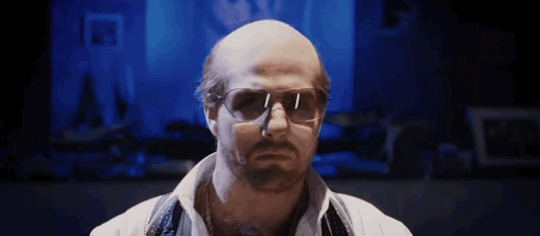Lights, Camera, Mania: Showbiz Satires Descents Into Madnessby Charles Bramesco
By Yasmina Tawil
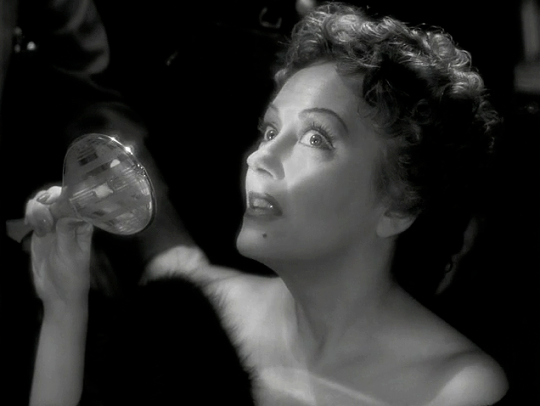
In his seminal tell-all Hollywood Babylon, Kenneth Anger claimed to reveal the festering truth beneath the dream factory of the American film industry. His was a bemused but cynical perspective on the business of show, reveling in the sordid juiciness of early Tinseltown controversies that usually concluded with tragedy, if not death. Representatives of the film idols referred to in the book lined up to denounce the tales of drug-fueled orgies and suicide cover-ups as conjecture and falsehood, and indeed, the modern reader would do well to take Anger’s gossip with a metric ton of salt.
But rather than a factual history, Anger’s book has more value as a portrait of a certain mentality specific to this professional milieu. Even if Clara Bow didn’t bang the entire USC football team, this progenitor of the celeb exposé spoke to true conditions of the culture surrounding the movie colony, suggesting that decadence and luxury made—and continue to make—it too easy to go mad with power. Readers flocked to Anger’s toxic oil spill of a book for the same reason airport bookstores regularly sell out of the latest A-lister’s confessional: it’s devilishly pleasurable to watch fame and fortune make someone act crazy.
The best Hollywood send-ups have adopted this jaded outlook, turning an eye inward to find a carnivorous business that masticates talent and spits it out once the flavor’s gone. The recent, toothless likes of Argo, La La Land, and The Artist have courted the label of satire with a line about expanded universes here or a jab at blowhard producers there, but these little rib-nudges have been affectionate counterpoints in otherwise adulatory valentines to the magic of the movies. The good stuff cuts to the dark heart of an industry that gives creative types—and who could possibly be more mentally infirm than a writer—too much money and influence for their own good.

The history of showbiz spoofery is the history of insanity: the finest entries have used the assorted pressures of filmmaking to push their characters to their wit’s end as an absurd representation of the corrosive forces of Hollywood. Starting from Anger’s sensationalist tracking of Frances Farmer’s long, sad descent into madness, all roads have led to the sanatorium.
The main thoroughfare is the derelict drag of Sunset Blvd. Billy Wilder was the first to conjure a human manifestation of filmmaking’s maggoty underbelly with Norma Desmond, a crumbling grand dame cannily played by crumbling grand dame Gloria Swanson. Swanson applied the exaggerated techniques of silent film acting to the talkie form in order to create an affected style marked by its own period, a symbol of decay in an industry obsessed with the new and young. She constructed an insular fantasy life in her isolated castle lair as a coping mechanism for her fall from prominence, and for his blackest joke, Wilder allowed her delusions to become reality in the film’s concluding punch line. Norma’s deteriorating psyche imbues the film around her with a bit of her mania, too; a funeral for a chimp Charlestons along the line between the silly and the somber. Even as he verged on the outlandish, he struck a chord; Louis B. Mayer famously bellowed to Wilder at an L.A. screening, “You have disgraced the industry that made and fed you! You should be tarred and feathered and run out of Hollywood!”
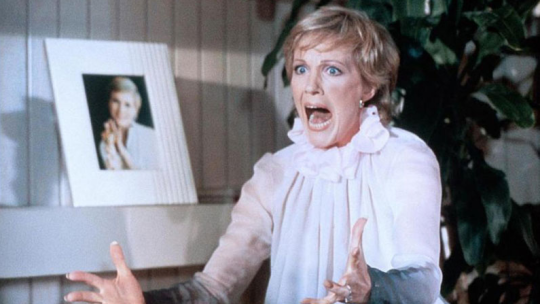
But this strain of satire truly hit the fever-pitch sweet spot with S.O.B. in 1981, trading the showbiz-specific indignity of aging past relevance for that of creative compromise. Director Blake Edwards plays a cruel and pernicious god to his Job-like plaything of Felix Farmer (Richard Mulligan), a producer driven to desperation by his first flop and willing to do anything in order to salvage it. He’s put through the wringer several times over, bungling four suicide attempts in increasingly pathetic fashion before arriving at the epiphany that sex was the missing ingredient from his character study of a closed-off woman retreating into the recesses of her own mind. (All we see of the fictitious Night Wind is a disturbing, surreal dream sequence set to “Polly Wolly Doodle” twice over, first as an unsettling juvenile fantasy and then as a doubly unsettling eroticized juvenile fantasy.)
The film industry, at least as it’s shown here, doesn’t function like other professional sectors. Nobody really knows what’s going to connect with an audience and what won’t, and to those working on the inside, it often feels like no rhyme or reason governs the separation of hits and misses. Edwards makes Felix into the casualty of a sense-defying work culture, where no bad idea or underhanded maneuver is off limits so long as it yields success at the end of the day. Felix grows deranged as a result of his constant humiliation, and resolves to play as dirty as the weaselly studio executives who cheat him out of the rights to his picture once it starts to look like a success. By the moment he’s killed due to his own harebrained plan, he’s been reduced to a nattering nutjob, martyred by a system seemingly resistant to logic.
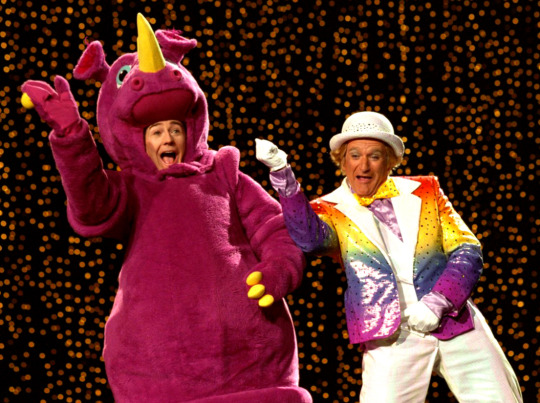
Robert Altman would torment another power-producer to the point of breaking a decade later with The Player, but the next film to actively integrate the mentality of lunacy into its overall atmosphere would be the gleefully unhinged Death to Smoochy. (It’s no coincidence that all the films mentioned so far drew powerfully polarized reactions at the time of their release; a draught this bitter has never gone down easy.) Shifting to the other side of the camera, director Danny DeVito mined laughs by transposing the cutthroat nature of big-leagues entertainment to the bush leagues of kids’ shows. He juxtaposed the core nastiness of back-room wheeling and dealing with the outward-facing nicety of Barney and his ilk, and in doing so, delivered an uncommonly misanthropic take on how the sausage of entertainment gets made.
Moreover, the film presented a physical manifestation of hyperactive id in Robin Williams’ corrupt, ruthless kiddie showman Rainbow Randolph. Starting at a coked-out 10 and only turning the dial higher from there, Williams rendered his role as a manifestation of pure, white-hot hate, screaming every line at the top of his lungs. As he goes about his dogged mission to dethrone his replacement Smoochy (Ed Norton as the chipper Sheldon Mopes), DeVito suggests that Randolph’s frenzied dysfunction simply reflects the fucked-upped-ness of his climate. The ostensibly incorruptible Sheldon is offered the seductions of money, pleasure, and influence, and while he’s able to remain true to his principles in the face of it all, Randolph’s the foil illustrating what happens to those without the required moral fortitude. He has a near-complete psychotic break at feature length, his mind irreparably warped by the deleterious forces of televised playtime.
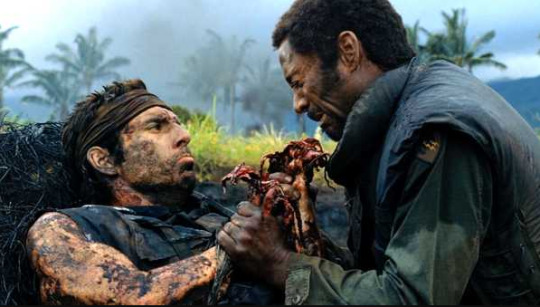
Tropic Thunder took a more specific set of reference points for its deflation of Hollywood ego and pretension, ultimately driving its subjects to the brink of sanity as well. Namely, the myth of Francis Ford Coppola and the notoriously calamitous production of Apocalypse Now (dutifully chronicled in the making-of documentary Hearts of Darkness) provided the guideline for this send-up of war films and the people who play make-believe in them. Coppola reportedly went a touch native while mounting his titanically ambitious epic in the jungles of Vietnam, and likewise, the prima donna actors dropped into the wild start to lose it when they realize the danger they’re in is bona fide.
Writer/director/star Ben Stiller gets in some good potshots at scuzzy corporate types (Tom Cruise’s craven studio head Les Grossman comes off looking the worst of all), but mainly lampoons the actors taking their craft seriously enough to lose sight of themselves. Both Stiller’s macho action hero and Robert Downey Jr.’s award-festooned boob slip into their assigned roles, extending Method acting to the point of fractured identity. Rather than taking aim on the machinery that generates movies, Stiller trains his crosshairs on the process of acting itself, mocking those artistes so wrapped up in “becoming” their role that they can’t tell where it begins and they end. Stiller accelerates their mental strain by dumping the cast in enemy territory, but they don’t end up anywhere that Jared Leto hasn’t gone of his own volition.
Just about all entertainment that goes behind the scenes of entertainment agrees that the job’s not a part-time gig, that creating art on this kind of scale demands a lot from the people involved. The gentler critiques have stopped the symptoms at workaholism, but these more incisive films expand that list to include a wide array of psychological hazards. Los Angeles runs on hysteria, on the single-minded willingness to do anything and everything to make the show go on. The innumerable “troubled-but-brilliant” biopics have made the suggestion that inner anguish is the noble sacrifice that true talents make for shouldering the burden of genius; in an art form as prone to disaster, complication, and overall FUBARification as cinema, it’s just the cost of doing business.
